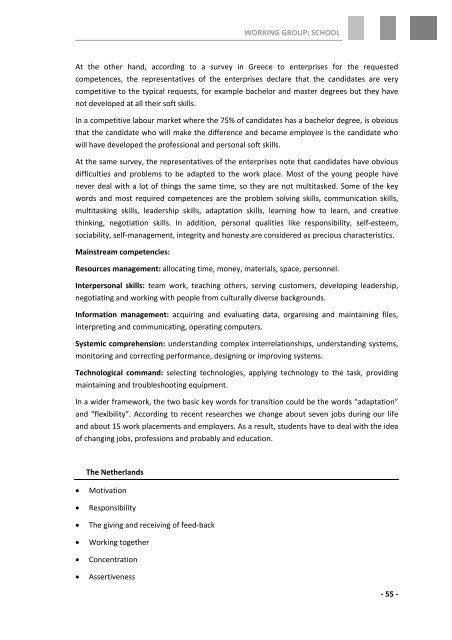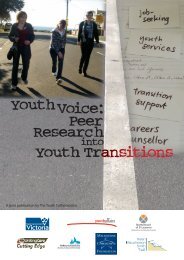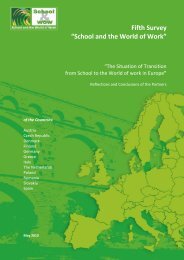Second Survey School and WOW.pdf
Second Survey School and WOW.pdf
Second Survey School and WOW.pdf
You also want an ePaper? Increase the reach of your titles
YUMPU automatically turns print PDFs into web optimized ePapers that Google loves.
WORKING GROUP: SCHOOL<br />
At the other h<strong>and</strong>, according to a survey in Greece to enterprises for the requested<br />
competences, the representatives of the enterprises declare that the c<strong>and</strong>idates are very<br />
competitive to the typical requests, for example bachelor <strong>and</strong> master degrees but they have<br />
not developed at all their soft skills.<br />
In a competitive labour market where the 75% of c<strong>and</strong>idates has a bachelor degree, is obvious<br />
that the c<strong>and</strong>idate who will make the difference <strong>and</strong> became employee is the c<strong>and</strong>idate who<br />
will have developed the professional <strong>and</strong> personal soft skills.<br />
At the same survey, the representatives of the enterprises note that c<strong>and</strong>idates have obvious<br />
difficulties <strong>and</strong> problems to be adapted to the work place. Most of the young people have<br />
never deal with a lot of things the same time, so they are not multitasked. Some of the key<br />
words <strong>and</strong> most required competences are the problem solving skills, communication skills,<br />
multitasking skills, leadership skills, adaptation skills, learning how to learn, <strong>and</strong> creative<br />
thinking, negotiation skills. In addition, personal qualities like responsibility, self‐esteem,<br />
sociability, self‐management, integrity <strong>and</strong> honesty are considered as precious characteristics.<br />
Mainstream competencies:<br />
Resources management: allocating time, money, materials, space, personnel.<br />
Interpersonal skills: team work, teaching others, serving customers, developing leadership,<br />
negotiating <strong>and</strong> working with people from culturally diverse backgrounds.<br />
Information management: acquiring <strong>and</strong> evaluating data, organising <strong>and</strong> maintaining files,<br />
interpreting <strong>and</strong> communicating, operating computers.<br />
Systemic comprehension: underst<strong>and</strong>ing complex interrelationships, underst<strong>and</strong>ing systems,<br />
monitoring <strong>and</strong> correcting performance, designing or improving systems.<br />
Technological comm<strong>and</strong>: selecting technologies, applying technology to the task, providing<br />
maintaining <strong>and</strong> troubleshooting equipment.<br />
In a wider framework, the two basic key words for transition could be the words “adaptation”<br />
<strong>and</strong> “flexibility”. According to recent researches we change about seven jobs during our life<br />
<strong>and</strong> about 15 work placements <strong>and</strong> employers. As a result, students have to deal with the idea<br />
of changing jobs, professions <strong>and</strong> probably <strong>and</strong> education.<br />
The Netherl<strong>and</strong>s<br />
<br />
<br />
<br />
<br />
<br />
<br />
Motivation<br />
Responsibility<br />
The giving <strong>and</strong> receiving of feed‐back<br />
Working together<br />
Concentration<br />
Assertiveness<br />
‐ 55 ‐




